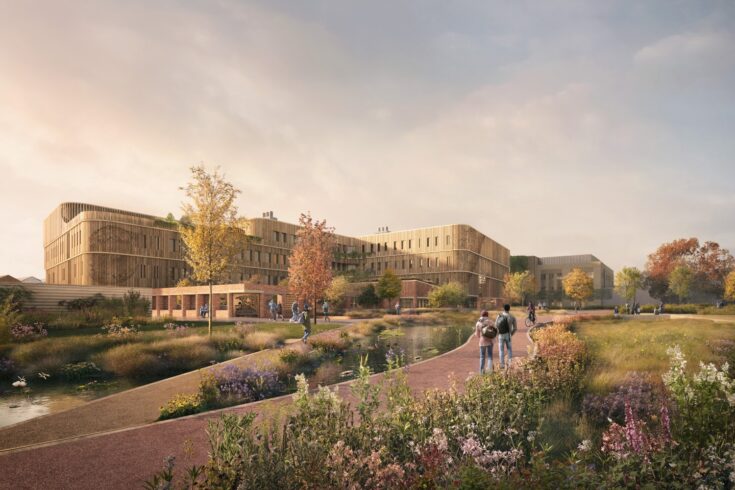The transformational investment will aid the development of new cutting-edge, world-class facilities for the John Innes Centre (JIC) and The Sainsbury Laboratory (TSL).
As well as transforming the existing capabilities of JIC and TSL, both internationally recognised centres of excellence in plant and microbial science, the new hub aims to become a net zero carbon laboratory.
It will deliver a step change in the UK’s capability to translate scientific knowledge into bio-based solutions in response to some of society’s most pressing challenges.
The hub will play a pivotal role in:
- reducing the impact of climate change
- providing long-term sustainable food solutions
- improving human health
- enhancing growth and economic prosperity across the UK and beyond
Next generation infrastructure
The JIC and TSL Next Generation Infrastructure programme is funded by the UK Research and Innovation (UKRI) Infrastructure Fund, which invests in the facilities, equipment and resources that are essential for researchers and innovators to do ground-breaking work.
The programme will develop the Norwich-based site over the next seven years, with £54.7 million being invested over the first three years and a total investment of £317.7 million from the fund.
Construction of the new hub is expected to be complete by 2030.
Strengthening UK bioscience
Professor Melanie Welham, Executive Chair of the Biotechnology and Biological Sciences Research Council (BBSRC), said:
Providing access to cutting-edge, sustainable research and innovation infrastructure is mission-critical to the competitiveness and long-term success of UK bioscience.
UKRI’s investment in the John Innes Centre and The Sainsbury Laboratory Next Generation Infrastructure provides an important opportunity to further improve our local connections with key partners at Norwich Research Park, the likes of which include Earlham Institute and Quadram Institute.
Beyond that, the investment also represents a real opportunity to establish a world-leading global interdisciplinary hub for plant and microbial sciences that will help deliver the bio-based solutions needed to address global challenges around sustainable agriculture, food, nutrition and health.
The power of plant and microbial science
Professor Graham Moore, Director of JIC, said:
Securing this funding is a major step forward in realising our vision to improve collaborative working across the UK and overseas, helping us to provide a safer, healthier and more sustainable future through the power of plant and microbial science.
As well as new laboratories, the investment includes a redevelopment of our plant growth facilities, which in conjunction with our existing field station, will improve our ability to study the effects of climate change.
Transforming global agriculture
Professor Nick Talbot FRS, Executive Director of TSL, said:
This transformational investment exemplifies the UK’s confidence in the future of our research institutes and their ability to transform global agriculture through innovation. It is imperative that agricultural production is transformed to become a net carbon zero activity that no longer relies on fossil fuels.
The investment from UKRI will enable us to harness the collaborative environment on the Norwich Research Park, catalysing new research initiatives and creating a unique asset for UK science and innovation.
Enabling an ambitious vision
The investment by UKRI will enable the realisation of an ambitious longer-term vision for JIC and TSL.
Healthy Plants, Healthy People, Healthy Planet (HP3) seeks to provide a safer, healthier and more sustainable future through the power of plant and microbial science.
This bold vision represents a revolution in plant and microbial sciences that strives to reach new levels of understanding by integrating advances in:
- computational biology
- genetics
- genomics
- live cell imaging
- structural biology
Collaborating for success
A fundraising campaign is currently underway at JIC and TSL to secure a further £30 million investment to support the full cost of the Next Generation Infrastructure programme and longer-term HP3 vision.
To date, the campaign has garnered generous contributions from:
- Garfield Weston Foundation
- Gatsby Charitable Foundation
- John Innes Foundation
- The Wolfson Foundation
- University of East Anglia
Visit the HP3 website to find out more about JIC and TSL’s vision to build a more sustainable future through the power of plant and microbial science or contact Felicity Perry at felicity.perry@jic.ac.uk

